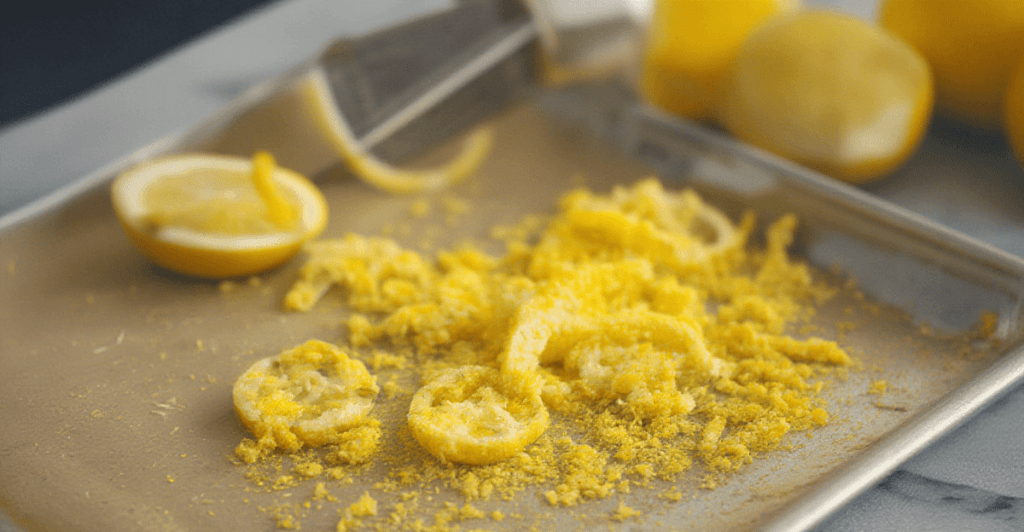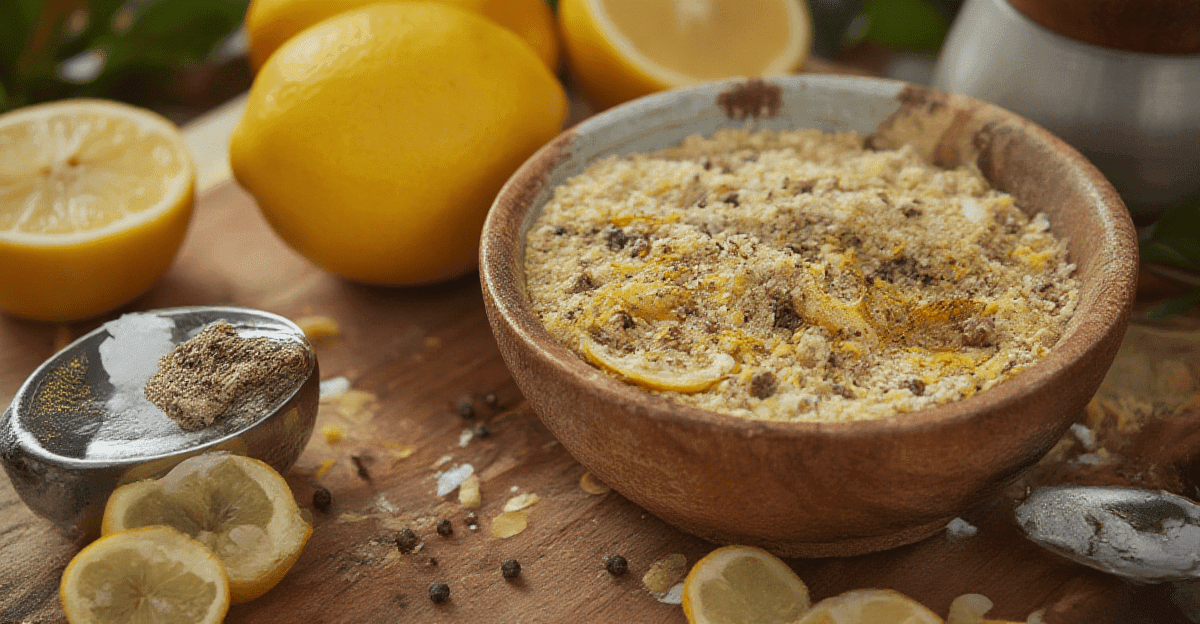Introduction
Lemon pepper is a versatile seasoning blend that combines the zesty brightness of lemon with the spicy warmth of freshly ground black pepper. Widely used in culinary traditions worldwide, it enhances the flavor of everything from meats and vegetables to pasta and snacks. This aromatic blend is beloved for its ability to balance tangy and spicy flavors, making it a favorite for both professional chefs and home cooks alike.
The origins of Citrus spice mix can be traced back to a simple combination of dried lemon zest and cracked black peppercorns, but over time, it has evolved to include various additives like salt, garlic, and sugar. Today, it’s available in store-bought varieties or can be made fresh at home for a truly customizable experience.
Ingredients of Lemon Pepper
Lemon pepper seasoning is made from simple, flavorful ingredients that work perfectly together. Each ingredient plays an important role in creating the tangy, peppery taste that makes this seasoning so popular. Let’s break it down:
Core Ingredients
- Lemon Zest
Lemon zest is the grated outer peel of a lemon. It’s packed with citrus oils that bring a fresh, tangy flavor to the mix. The zest is dried and sometimes ground into smaller pieces to blend well with other ingredients. - Black Pepper
Black pepper is the star of the seasoning, adding a sharp, spicy kick. The peppercorns are usually cracked or coarsely ground, so they have a bold texture and flavor. - Salt
Salt is often added to balance the sharpness of the pepper and the tang of the lemon. It enhances the overall taste of the blend and brings out the natural flavors of your dishes.
Optional Additives
- Garlic Powder
Garlic powder is sometimes included for an extra layer of savory flavor. It pairs well with the citrusy tang of the lemon. - Sugar
A small amount of sugar can be added to round out the flavors and soften the sharpness of the pepper and lemon. - Herbs
Some versions of Citrus spice mix include herbs like parsley, thyme, or dill for added depth. These can give the seasoning a unique twist. - Oil or Anti-Caking Agents
In store-bought varieties, you might find a small amount of oil or anti-caking agents. These help keep the mixture fresh and prevent clumping.
Why These Ingredients Work Together
The combination of lemon zest and black pepper is a match made in flavor heaven. The zest adds brightness, while the pepper adds heat, creating a seasoning that’s both refreshing and spicy. When salt is added, it amplifies the taste of both key ingredients. Optional additives like garlic and herbs add variety and customization, making lemon pepper seasoning a versatile choice for countless recipes.
By using fresh, high-quality ingredients, you can make a Citrus spice mix blend that stands out from anything you’d find in a store.
How to Make Lemon Pepper at Home

Making lemon pepper seasoning at home is simple, fun, and rewarding. Plus, you get to control the ingredients, so it’s fresher and can be adjusted to suit your taste. Let’s go step by step to create this flavorful blend.
What You’ll Need
Before we begin, here’s a list of ingredients and tools you’ll need:
- Ingredients:
- Fresh lemons (you’ll need the zest)
- Black peppercorns (or coarsely ground black pepper)
- Salt (optional but recommended)
- Garlic powder, sugar, or dried herbs (optional for variations)
- Tools:
- A grater or zester
- A baking sheet
- An oven or dehydrator
- A grinder or mortar and pestle
Step-by-Step Guide
Step 1: Zest the Lemons
Start by washing the lemons thoroughly to remove any dirt or residue. Use a grater or zester to scrape off the yellow outer peel. Be careful not to include the white layer underneath (called the pith), as it can taste bitter.
Step 2: Dry the Lemon Zest
Spread the lemon zest in a thin layer on a baking sheet. Set your oven to the lowest temperature (around 150°F or 65°C). Place the baking sheet in the oven and let the zest dry for about 1-2 hours, checking occasionally. Alternatively, you can use a dehydrator for this step. The zest is ready when it feels crisp and dry to the touch.
Step 3: Grind the Black Pepper
While the zest is drying, grind your black peppercorns. If you don’t have a grinder, you can crush them with a mortar and pestle or even the back of a spoon. Aim for a coarse texture—it adds more flavor.
Step 4: Mix the Ingredients
Once the zest is dry, mix it with the black pepper. Add salt and any optional ingredients like garlic powder, sugar, or herbs if you prefer. Adjust the proportions to match your taste. A good starting ratio is:
- 1 part dried lemon zest
- 1 part ground black pepper
- ½ part salt
Step 5: Store Your Lemon Pepper
Transfer your Citrus spice mix blend to an airtight container, like a small jar or spice bottle. Store it in a cool, dry place to keep it fresh. Properly stored, it can last for up to 6 months.
Tips for the Best Results
- Use fresh lemons: Fresh zest has more oils and flavor compared to dried lemon peels.
- Experiment with flavors: Add a touch of cayenne pepper for heat or dill for a herbal twist.
- Test as you go: Taste your blend during mixing to ensure the flavor is just right.
Why Make It at Home?
Homemade Citrus spice mix is not only fresher but also free from artificial preservatives and additives. You can adjust the ingredients to suit your dietary needs, like reducing salt or avoiding added sugar. Plus, it’s budget-friendly and easy to whip up in no time!
Uses of Lemon Pepper in Cooking

Lemon pepper is a seasoning that works like magic in the kitchen. Its tangy and peppery flavor can enhance many dishes, making your meals more exciting and delicious. Let’s explore some of the best ways to use Citrus spice mix in your cooking.
Lemon Pepper for Meat Dishes
- Chicken
Lemon pepper is one of the most popular seasonings for chicken. Whether you’re roasting, grilling, or pan-frying, it adds a fresh, zesty kick to chicken breasts, wings, or thighs. Try marinating your chicken with olive oil, Citrus spice mix, and a splash of lemon juice before cooking for extra flavor. - Fish and Seafood
Seafood and Citrus spice mix are a perfect match. The citrusy flavor complements fish like salmon, tilapia, and cod beautifully. Sprinkle it on shrimp or scallops before sautéing, and you’ll have a restaurant-quality dish in minutes. - Beef and Pork
While it’s not as common, Citrus spice mix can add a surprising twist to beef and pork. Use it as a dry rub for steaks, ribs, or chops to bring out a fresh and tangy flavor.
Vegetables and Side Dishes
- Roasted Vegetables
Lemon pepper can turn ordinary roasted vegetables into a flavorful side dish. Toss veggies like broccoli, asparagus, carrots, or zucchini with olive oil and Citrus spice mix, then roast them in the oven until tender. - Potatoes
Sprinkle Citrus spice mix on baked potatoes, mashed potatoes, or potato wedges for a refreshing upgrade. The seasoning pairs especially well with the creamy texture of potatoes. - Rice and Grains
Mix lemon pepper into rice, quinoa, or couscous for a bright and zesty side dish. It’s an easy way to add flavor without extra sauces or heavy spices.
Pasta and Salads
- Pasta Dishes
Lemon pepper adds a light and tangy flavor to pasta. Toss it with olive oil, garlic, and cooked pasta for a simple yet flavorful dish. You can also use it in creamy pasta sauces for an extra punch of flavor. - Salads
Use lemon pepper as a seasoning for salads. It’s great for seasoning grilled chicken or shrimp to top your greens. You can even mix it into salad dressings for an extra kick.
Snacks and More
- Popcorn
Sprinkle lemon pepper on freshly popped popcorn for a unique, savory snack. It’s a healthier alternative to butter-based toppings. - Chips and Fries
Dust your chips or fries with lemon pepper for a tasty twist. It’s especially good on sweet potato fries. - Eggs
Add a sprinkle of lemon pepper to scrambled eggs, omelets, or boiled eggs for a quick flavor boost.
Why Lemon Pepper is So Versatile
The beauty of lemon pepper is how it balances flavors. The zestiness of the lemon brightens dishes, while the pepper adds a warm spice. This combination works well in almost any recipe, making it a go-to seasoning for busy cooks.
With so many ways to use it, Citrus spice mix is a must-have in your kitchen. Whether you’re making a quick snack or preparing a fancy dinner, it’s the seasoning that never disappoints.
Health Benefits of Lemon Pepper
Lemon pepper doesn’t just make your food taste great; it can also be good for your health. Since it’s made from natural ingredients like lemon zest and black pepper, it carries some amazing benefits. Let’s take a closer look at why adding lemon pepper to your meals can be a healthy choice.
Rich in Antioxidants
- Lemon Zest
Lemon zest is full of antioxidants, which are natural compounds that help protect your body from damage caused by harmful molecules called free radicals. These antioxidants can support healthy skin, boost your immune system, and even lower your risk of certain illnesses. - Black Pepper
Black pepper contains a powerful antioxidant called piperine. Piperine not only helps fight free radicals but also improves the absorption of nutrients from other foods. This means your body gets more out of the vitamins and minerals in your meals.
Supports Digestion
- Pepper’s Role in Digestion
Black pepper is known to stimulate digestive enzymes, making it easier for your stomach to break down food. This can help reduce bloating, gas, and discomfort after meals. - Lemon’s Benefits for the Stomach
Lemon zest has a natural alkalizing effect, which may help balance the acidity in your stomach. This can promote better digestion and prevent issues like heartburn.
Low in Calories
One of the best things about lemon pepper is that it’s full of flavor but very low in calories. If you’re watching your weight, lemon pepper is a great way to add zest and spice to your meals without adding extra fat or sugar.
May Help with Inflammation
- Black Pepper’s Anti-Inflammatory Properties
Piperine, the active compound in black pepper, is believed to have anti-inflammatory properties. This means it could help reduce swelling or pain caused by inflammation in the body, such as arthritis. - Lemon’s Vitamin C Content
Lemon zest is a source of vitamin C, which also has anti-inflammatory benefits. Vitamin C supports your immune system and helps repair tissues in your body.
Sodium-Free Option
For people trying to reduce their salt intake, lemon pepper can be a flavorful alternative. You can make it at home without adding any salt. This is especially useful for those with high blood pressure or anyone on a low-sodium diet.
Boosts Flavor Without Artificial Additives
Unlike some pre-packaged seasonings that are full of artificial flavors and preservatives, homemade Citrus spice mix is completely natural. It’s a clean and healthy option for adding a burst of flavor to your dishes.
In Summary
Lemon pepper is more than just a tasty seasoning—it’s a blend that offers several health benefits. From supporting digestion to fighting inflammation, it’s a simple way to make your meals healthier. Plus, because it’s so versatile, it’s easy to include in almost any recipe.
Lemon Pepper vs. Other Seasonings
Lemon pepper is a unique seasoning, but how does it compare to other popular blends? Let’s explore how it stacks up against other seasonings like Cajun, BBQ, and Italian spice blends. This will help you decide when to use Citrus spice mix and when another seasoning might be a better fit.
Lemon Pepper vs. Cajun Seasoning
- Flavor
Lemon pepper has a tangy, citrusy flavor with a hint of spice from black pepper. On the other hand, Cajun seasoning is bolder and spicier, often made with paprika, cayenne pepper, and garlic powder. While Cajun seasoning is great for adding heat, Citrus spice mix is better for a lighter, fresher taste. - Uses
Cajun seasoning works best for dishes like gumbo, jambalaya, or spicy grilled meats. Lemon pepper is more versatile, perfect for chicken, fish, vegetables, or even pasta.
BBQ Seasoning vs. Lemon Pepper
- Flavor
BBQ seasoning is sweet, smoky, and savory, often made with ingredients like brown sugar, smoked paprika, and onion powder. Lemon pepper has a tangy, zesty taste with a peppery kick, making it a completely different flavor profile. - Uses
BBQ seasoning is ideal for ribs, burgers, or pulled pork. Lemon pepper is the better choice for dishes where you want a bright, fresh flavor, like seafood or roasted veggies.
Lemon Pepper vs. Italian Seasoning
- Flavor
Italian seasoning is a mix of dried herbs like oregano, basil, and thyme, giving it an earthy, herbal flavor. Lemon pepper stands out with its citrusy and spicy notes, offering a more vibrant taste. - Uses
Italian seasoning is great for pasta sauces, pizzas, or soups. Lemon pepper works well as a marinade or topping for grilled chicken, fish, or roasted potatoes.
Why Choose Lemon Pepper?
- Fresh and Light Flavor
Lemon pepper’s unique combination of zest and spice makes it a standout choice for dishes that need a refreshing flavor. - Versatility
While other seasonings are tailored for specific cuisines or dishes, lemon pepper can be used in almost anything, from meats to snacks. - Customizable
When you make Citrus spice mix at home, you can adjust the ingredients to suit your taste or dietary needs. This flexibility sets it apart from many other pre-made blends.
When to Use Other Seasonings
While lemon pepper is incredibly versatile, there are times when other seasonings might work better. For example:
- Use Cajun seasoning for a spicy kick in Creole or Southern recipes.
- Pick BBQ seasoning for sweet and smoky flavors in grilled or roasted meats.
- Go for Italian seasoning when you want a classic herb mix for Mediterranean dishes.
Final Thoughts
Citrus spice mixr has its own unique place among seasonings. Its bright and tangy taste is perfect for adding freshness to your meals. While other blends like Cajun or BBQ offer bold or smoky flavors, Citrus spice mix stands out as a lighter and more versatile option.
FAQs
What is a good substitute for lemon pepper?
If you don’t have Citrus spice mix on hand, don’t worry—you can easily create a substitute using simple ingredients. Combine fresh lemon zest or juice with black pepper and a pinch of salt. You can also add garlic powder or dried herbs like thyme for extra flavor. If you need a quick fix, mixing lemon juice and cracked black pepper directly onto your food works well too.
Is lemon pepper different from lemon and pepper?
Yes, Citrus spice mix is different from just lemon and pepper. While it uses these two ingredients as a base, Citrus spice mix is a seasoning blend that often includes dried lemon zest, black pepper, and sometimes salt, garlic, or sugar. The lemon zest is dried and mixed with the other ingredients, creating a seasoning that’s more balanced and versatile than simply squeezing lemon juice and sprinkling pepper.
Is lemon pepper anti-inflammatory?
Yes, Citrus spice mix can have anti-inflammatory benefits. Black pepper contains piperine, a compound known for its anti-inflammatory properties. Lemon zest, on the other hand, is a source of vitamin C, which supports the immune system and may reduce inflammation. Together, these ingredients can contribute to a diet that helps manage inflammation naturally.
Is lemon pepper an Atlanta thing?
Lemon pepper is popular nationwide, but it holds a special place in Atlanta’s food culture. Atlanta is famous for its “lemon pepper wet” wings—a variation that combines Citrus spice mix seasoning with a buttery sauce, creating a mouthwatering dish. This iconic Atlanta specialty has become a must-try for locals and visitors alike, solidifying lemon pepper’s place in the city’s food scene.
Conclusion
Lemon pepper is a one-of-a-kind seasoning that brings a burst of flavor to countless dishes. Its tangy lemon zest and bold black pepper make it a versatile choice for everything from chicken and fish to vegetables and snacks. Whether you’re a home cook experimenting in the kitchen or a foodie exploring new recipes, Citrus spice mix is a seasoning worth having in your pantry.
Not only does it enhance your meals, but it also offers several health benefits. Its natural ingredients like lemon zest and black pepper provide antioxidants, aid digestion, and support a healthy lifestyle. Plus, making your own Citrus spice mix blend at home is easy, affordable, and allows for endless customization.
Citrus spice mix is more than just a seasoning—it’s a way to brighten up your cooking and add excitement to everyday meals. Whether you’re sprinkling it on roasted veggies or enjoying Atlanta’s famous Citrus spice mix wet wings, this seasoning proves its versatility and appeal time and time again.
So why not try it out? Add some zest to your cooking today and see how Citrus spice mix can transform your dishes!

